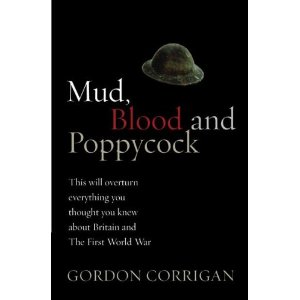Mud, Blood and Poppycock October 6, 2012
Author: Beach Combing | in : Contemporary , trackbackBeach has a question that he always enjoys asking first year American university students: did World War One/World War Two/the Cold War represent a fight between good and evil? Class after class, semester after semester the pattern repeats itself. The Second World War is almost universally held up as such a war. Usually a quarter of the class – typically hardcore Republicans – will describe the Cold War in these terms. And then there may be a lonely student or two who dare – typically out of bravado rather than knowledge – to describe the First World War thus: others talk about an ‘imperial war’ or a ‘clash of empires’ and shake their heads sadly. The same is true for WW1 in the mainstream media, novels, films and documentaries in the English-speaking world. And there are so few contrary opinions in the public arena that a book that argues differently deserves to be celebrated, be it right or wrong.
Such a book is Gordon Corrigan’s Mud, Blood and Poppycock: Britain and the First World War (Phoenix 2004). GC not only restates the case for fighting the Central Powers: an argument perhaps more persuasive now for the Anglo-Saxon powers than a century ago. He also knocks down a series of myths about that war including the ‘absurdity’ of cavalry, the alleged injustices carried out by military courts and the supposed incompetence of British generals. Reader beware: for all the fanfare there is actually relatively little new research here. Rather we have an enjoyable, polemical rendering of the studies carried out by Great War historians in the last generation. So ‘butcher’ Haig’s ability does not need to be demonstrated. That has been done many times before and in greater and more persuasive detail. But GC’s gift is to save Haig’s reputation by publicising the arguments made by specialists. Any idea that does not square with the anti-war message that the 1920s and 1930s and then again the 1960s and 1970s posited on the 1914-1918 conflict is going to have trouble swimming to the surface.
Sometimes, and this is always the nature of polemical books, the arguments deserve to be picked at. For example, GC often defends Allied and particularly British errors because a situation was new to them: ‘mistakes will happen’. There is no question that everyone in WW1 found themselves in a strange new situation: static warfare caused much head scratching on all sides. But perhaps GC does not give enough credit to the Germans for learning many of the most important lessons first: reinforce success not failure, train specialist trench raiders etc etc. He certainly does not criticise the German army enough for their atrocities against civilian populations in Belgium and France. It is also true that British casualties for WW1 are exaggerated: and GC explains why, the geographical and class concentrations were striking. God help you if you were a non-commissioned officer from Barnsley. But in these matters perception matters almost as much as the demographic realities. Britain was not accustomed to losing large numbers in warfare and the pall of despair spread out over the country. Then when you turn to France and Germany we move from impressions to almost unbelievable realities… Beach is always on the look out for good history books: drbeachcombing AT yahoo DOT com



